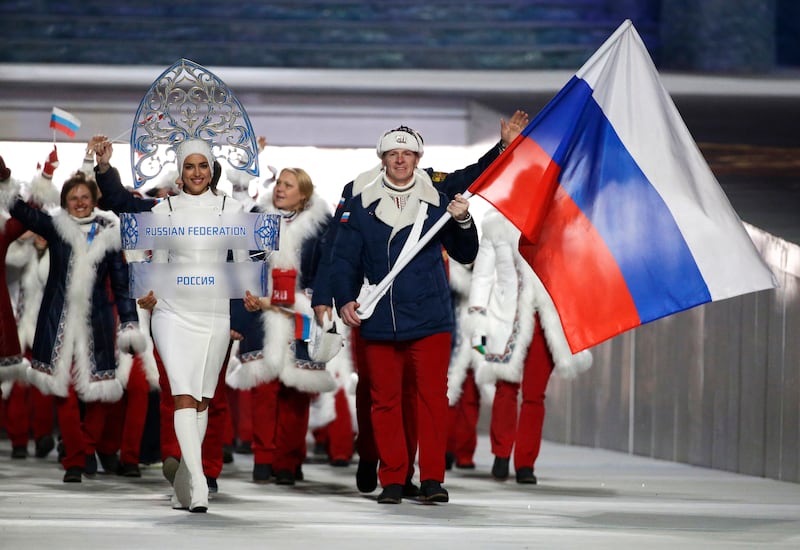International Olympic Committee leaders decided Tuesday there’s no place in the Opening Ceremonies’ parade of nations for the Russian and Belarusian athletes who qualify to participate in the 2024 Summer Games in Paris.
The parade, set to be held for the first time on boats that will sail down the Seine River, will be off limits for the neutral competitors “since they are individual athletes,” James Macleod, the IOC’s Olympic solidarity and national Olympic committee relations director, told reporters during a virtual press conference held after the closed IOC Executive Board meeting in Switzerland.
“The logic was very clear to us in that the individual neutral athletes will be competing as individuals,” Macleod said of the board’s unanimous decision. “During an opening ceremony, the athletes parade as delegations or teams. Since they won’t be a delegation or a team, that was the main reason behind that.”
There was a precedent set in the 1992 Summer Games in Barcelona, Spain, he said, with participants from the former Yugoslavia that was then under United Nations sanctions being kept out of the parade. Macleod said Russian and Belarusian athletes will be inited to attend the ceremonies so they can “experience the event.”
No decision has been made yet about Russians and Belarusians participating in the Closing Ceremonies that will end the Paris Olympics, but a news release said it “will be taken at a later stage, taking into consideration that it is not teams that enter the Closing Ceremony, but all athletes jointly together.”
Also decided during the first of two days of IOC’s Executive Board meetings was what flag and anthem will be displayed if any of the neutral athletes make it to the medals stand. The simple turquoise flag spells out they are competing as individual neutral athletes or AINs and what Macleod called an uplifting anthem, which has no lyrics, was commissioned by the IOC.
A three-member panel announced Tuesday is charged with determining which Russians and Belarusians meet the standards previously set to compete as neutral athletes that include not actively supporting Russia’s invasion of Ukraine with help from Belarus.
So far, the IOC said Tuesday, only a dozen Russians and seven Belarusians have qualified to compete in Paris this summer, with projections those numbers will likely reach a total of 58, although the could go as high as 82. That compared to the 330 Russians and 104 Belarusians who took part in the 2020 Summer Games, held in Tokyo a year late due to the COVID-19 pandemic.
The participation of Russian and Belarusian athletes in the first Olympics held since the start of the ongoing war in Ukraine more than two years ago has sparked heated controversy. The IOC, which initially banned Russians and Belarusians from international competition, affecting events around the world including in Utah, later reversed their position.
That results in threats of an Olympic boycott from officials in Ukraine and its allies as well as condemnation from Russia, which saw the suspension of its national Olympic committee by the IOC for annexing sports organizations within Ukraine. Even before the war, Russians had to compete under a national Olympic committee flag due to doping violations.
Russia’s effort to counter the Olympics with “Friendship Games” set to be held in September with a winter version coming in 2026, were blasted by the IOC in a news release Tuesday as “a cynical attempt by the Russian Federation to politicize sport” that could lead to athletes being “exploited as part of a political propaganda campaign.”
At Tuesday’s news conference, Macleod said while the Russian event is not seen as a “rival to the Olympic Games,” the IOC is speaking out against he “politicization that is growing and growing across the world and making sure that everyone was clear on our position relating to those Games.”
Whether participants in the Friendship Games could face punishment is “something that will have to be looked at in the future” by international sports federations and national Olympic committees, he said, adding that the Russian event is not sanctioned by the World Anti-Doping Agency set up by the IOC.
“For us, we would believe that an athlete that would take part in that is actually putting him- or herself at risk, not only from a doping point of view but also from a propaganda point of view,” the IOC director told reporters. “So we’d have to look at that very carefully.”
The escalating tensions come as security concerns for the Paris Olympics. Organizers recently scaled back plans for up to 600,000 people to be able to watch the parade of nations from the Seine’s riverbanks for free by registering. Now, the number of invitation-only spectators will be reduced by half, with some having to pay for tickets.


